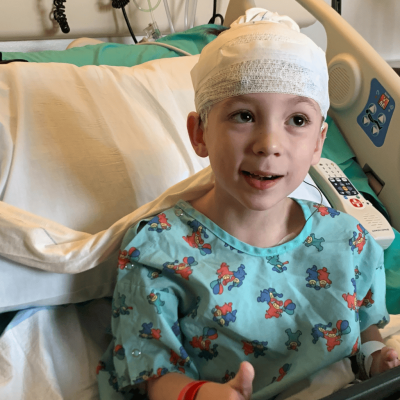Collaboration Opportunities for Industry
As a convener of the Dravet syndrome community, DSF has the tools, experience, and connections you need to accelerate your Dravet syndrome treatment development program. Our established resources facilitate each phase of development. Join us in working together to address the many unmet needs for the treatment of Dravet syndrome.
Contact us to connect and learn more.

Why Dravet syndrome?
Dravet syndrome is a rare developmental and epileptic encephalopathy that affects 1 in every 15,700 children worldwide, with the majority of patients carrying a mutation in the sodium channel gene SCN1A. It begins in infancy and proceeds with accumulating morbidity that significantly impacts individuals throughout their lifetime, increasing in severity in early childhood.
Current treatment options are limited, and the constant care required for someone suffering from Dravet syndrome can severely impact the quality of life for patients and families. Patients with Dravet syndrome face a 15-20% mortality rate due to SUDEP (Sudden Unexpected Death in Epilepsy), prolonged seizures, seizure-related accidents such as drowning, and infections.

Why Now?
We believe that life-changing treatments are on the horizon because Dravet syndrome has:
- An Identified Causal Gene
- Predictive Cell and Animal Models
- Established Centers of Excellence
- Clear Diagnostic Guidelines and Accurate Medical Codes
- Published Characterization of Natural History
- An Educated, Organized, and Engaged Patient Community

Our Resources
DSF is the largest nongovernmental funder for research focused on Dravet syndrome, worldwide. We act as a convener, connecting patient families, clinicians, researchers, and biopharma. Our resources include:
- Network of over 3,300 Dravet Syndrome Patient Families
- Scientific and Medical Advisory Boards
- Academic Research Funding
- Commercial iPSC Cell Lines (in development- anticipated 2025)
- 24 US-based Comprehensive Care Centers
- Listings for Enrolling Clinical Trials & Overview of Pipeline
- Annual Research Roundtable
- Biennial Family & Professional Conference
- Voice of the Patient Report from our 2022 Externally-Led Patient Focused Drug Development Meeting
Why DSF?
As the leading Dravet syndrome research and advocacy organization, the Dravet Syndrome Foundation (DSF) has invested over $10.5M in research, leading to significant advancements in our understanding of the disease mechanisms and clinical presentation of Dravet syndrome. Even larger than the dollar amount is the impact DSF has had on the field of research and clinical care through connecting disparate groups of stakeholders, advocating for research, amplifying the voice of the patient, and curating information. DSF has partnered with pharmaceutical and biotechnology companies at nearly every stage of development.
For guidance on interacting with Rare Disease Groups with a focus on the important roles of both Patients and Sponsors in Patient Focused Drug Development, review this Guide to Patient Involvement in Rare Disease Therapy Development from the EveryLife Foundation for Rare Disease.
Below are examples of ways DSF has partnered in the past with companies at various stages of development:
Early Stages of Discovery and Preclinical Studies
- patient-family perspective on unmet medical needs, priority symptoms to address, and benefit-risk considerations
- information on validated disease models
- insight on the overall field of discovery and development
- connections with Key Opinion Leaders and potential research collaborators
- where appropriate, Letters of Support from DSF
Late-Stage Preclinical/ Pre-IND
- formation of caregiver panels for clinical trial planning
- insight on Patient Focused Drug Development for Dravet syndrome
- participation in meetings with regulators to provide the patient voice
- direct feedback on trial processes and patient-facing materials
- opportunities for industry to present preclinical work and study plans to the patient and professional communities
Clinical Study Phases
- curated webpage for actively enrolling clinical studies
- patient-community outreach and education on clinical study opportunities
- opportunities for industry representatives to present information about ongoing studies and interact with the community
- dissemination of information about trial progress and results
Post-Approval
- raising patient-community awareness of new treatment options
- collaboration with clinical community on updating consensus guidelines to incorporate new treatment advancements
- feedback on patient-facing materials
- dissemination of results of ongoing studies to the community
Companies we have worked with:





